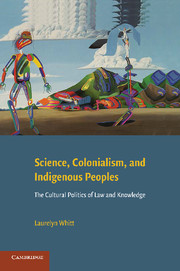Book contents
Conclusion – The Politics of Knowledge: Resistance and Recovery
Published online by Cambridge University Press: 04 August 2010
Summary
If we do not resist, we will not survive. Our resistance will guarantee our children a future.
– Winona LaDukeKnowledge has not become politicized; it always has been so. Indigenous knowledge systems explicitly recognize this by their responsiveness to the normative aspects of knowledge, to how human power and agency must be constrained if relations of affiliation with other entities are to be acknowledged and maintained – relations which enable our mutual, and multigenerational, survival. Yet the ideology of western science, wedded as it is to the thesis of value-neutrality, insists that issues of power do not enter into knowledge making or shape the dynamics of knowledge systems. The relations of domination and assimilation which characterize imperialism (whether in its historical or contemporary variants), and which facilitate biocolonialism, are thus neither acknowledged nor acknowledgeable.
And so the endangered status of indigenous knowledge systems is recognized, but responsibility for it, complicity in it, is denied:
[C]ritical analysis of why Indigenous Knowledge is threatened … rarely moves beyond the rather simplistic assertion that the “Elders are dying” or the assumption that IK systems are more vulnerable … because they are oral…The answers to how and why our knowledge has become threatened lie embedded in the crux of the colonial infrastructure.
With the aid of such depoliticization, corporate, academic, legal, and governmental institutions pool their interests and immense resources to extract from these knowledge systems what they find valuable in them.
- Type
- Chapter
- Information
- Science, Colonialism, and Indigenous PeoplesThe Cultural Politics of Law and Knowledge, pp. 219 - 224Publisher: Cambridge University PressPrint publication year: 2009



